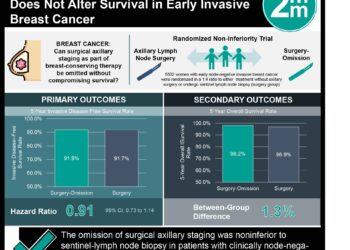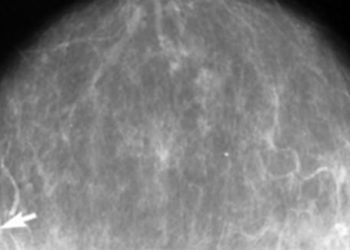AstraZeneca and Daiichi Sankyo: Enhertu significantly reduced the risk of disease progression in low and ultra-low HER2 metastatic breast cancer.
- In patients with hormone-receptor (HR)-positive metastatic breast cancer and low or ultra-low levels of HER2 expression, Enhertu led to a significantly decreased risk of disease progression compared to patients treated with standard chemotherapy.
- Enhertu treatment was associated with adverse events, including death from drug-related interstitial lung disease.
The Latest
In the DESTINY-Breast06 Phase III randomized trial, patients with hormone-receptor (HR)-positive metastatic breast cancer and low or ultra-low levels of HER2 expression were treated with Enhertu or standard chemotherapy. Patients treated with Enhertu had a significantly decreased risk of disease progression compared to patients treated with standard chemotherapy. The overall survival data is still in progress but preliminarily, Enhertu showed a favorable trend toward improved survival in HER2-low patients. However, patients treated with Enhertu were noted to have adverse events, including three who died from drug-related interstitial lung disease.
Physician’s Perspective
Breast cancer is the second most common cancer with more than two million breast cancer cases diagnosed in 2022 and more than 665,000 deaths globally. Patients with breast cancer are often treated with targeted therapy based on the protein expression of their tumor cells, such as the expression of HER2. Patients with high levels of HER2 expression are often treated with HER2-directed therapies while therapeutic options for patients with low HER2 expression are more limited. This new therapy for patients with low and ultra-low levels of HER2 provides another option as opposed to standard chemotherapy.
Molecular Target of Therapy
HER2 is a protein expressed in many types of tumor cells, including breast tumors. Up to 70% of hormone-receptor-positive breast cancer tumors are classified as HER2- negative but within this group, many patient tumors will still carry some level of HER2 expression. Expression of HER2 is typically determined by an imaging-based technique called immunohistochemistry (IHC). In patients with hormone-receptor (HR)-positive disease, about 60-65% of patients have low HER-2 expression while 20-25% have ultra-low HER2 expression. Enhertu is an antibody-drug conjugate that consists of a HER2-targeting monoclonal antibody attached to a topoisomerase I (TOP1) inhibitor. Once the monoclonal antibody portion binds to HER2 receptors on cancer cells, the TOP1 inhibitor is internalized, leading to an inhibition of DNA replication.
Company History
Enhertu was discovered by Daiichi and is being jointly commercialized by Daiichi and AstraZeneca. In addition to the DESTINY-Breast06 trial, both companies have ongoing trials examining the use of Enhertu as a first-line treatment and comparing it with other commercial antibody-conjugate therapies in patients with metastatic breast cancer.
Further reading: https://www.astrazeneca.com/media-centre/press-releases/2024/Enhertu-demonstrated-median-progression-free-survival-thirteen-months.html
©2024 2 Minute Medicine, Inc. All rights reserved. No works may be reproduced without expressed written consent from 2 Minute Medicine, Inc. Inquire about licensing here. No article should be construed as medical advice and is not intended as such by the authors or by 2 Minute Medicine, Inc.







